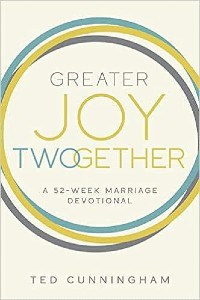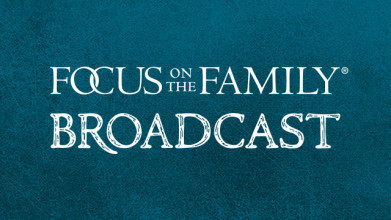Ted Cunningham: “I don’t want to hear about your day by overhearing your phone calls.”
Jim Daly: Hmm.
Ted: “Like, I- I want it to be us, one on one.” And- and so I made the decision years ago that it is so important to make sure she gets the best of my words, the best of my energy, the best of my time. And not the leftover.
John Fuller: Ted Cunningham joins us today on Focus on the Family to describe how to find joy in your marriage. Thanks for joining us. Your host is Focus President and author Jim Daly. And I’m John Fuller.
Jim: You know, John, God’s given us a lot of dos and don’ts in marriage. But one do that he has for us is to enjoy our marriages. And I love that. I like the concept. Uh, it’s a gift that God’s given us.
And even when we go through tough seasons with our spouse, uh, we should still treat marriage like the unique blessing that it is.
Now, for example, the Old Testament book called the Song of Solomon is filled with poetry about the joys of the love between King Solomon and his bride. Solomon focuses on the fact that marriage is to be enjoyed and cherished. And God’s desire for us is to find joy and contentment in our spouse, uh, no matter what distractions life may bring to us.
John: Yeah. And, uh, our guest today brings humor. And, uh, he’s gonna have great stories to describe how he’s learned to cherish his own marriage.
Ted Cunningham is the founding pastor of Woodland Hills Family Church in Branson, Missouri. And Ted serves as a lead marriage coach for the American Association of Christian Counselors. He’s also a regular contributor to Christian Counseling Today magazine.
He’s been here a number of times, and has written a number of books. Uh, we’re gonna lean into some of the content and concepts in his book called Greater Joy TWOgether: A 52-Week Marriage Devotional.
And you can learn more about that at focusonthefamily.com/broadcast. Or call 800, the letter A, and the word Family.
Jim: Ted, welcome back.
Ted: Thanks for having me.
Jim: It’s so good to have you here.
Ted: I love being here.
Jim: I always enjoy it because we laugh a lot.
Ted: (laughs)
Jim: And that’s fun. It’s good to laugh, I think.
Hey, let’s get right to it. I read, uh, a quote that you had, where you said, “God gave you a spouse to accompany you through the grind of life. But when your spouse becomes the grind, then your marriage drifts.”
Ted: Yeah. Yeah.
Jim: Why is it always the other (laughs) person’s fault?
Ted: (laughs) Oh …
Jim: How about if I become the grind?
Ted: [inaudible]
Jim: I think Jean would say, “You’re the grind.” (laughs)
Ted: Yes, it goes both ways.
Jim: (laughs)
Ted: I have one goal in life every day when I get up with Amy: and that is to make her laugh every single day. And-
Jim: That’s a good goal.
Ted: Yeah.
Jim: Does it work? (laughs)
Ted: I am 5 out of 7 days a week, I get what I call her silent patriotic laugh.
Jim: (laughs) Oh, that’s good.
Ted: When she finds something funny, she places her hand over her heart, she leans forward, and nothing comes out. Like, she doesn’t breathe. And when I get that level of belly laugh … Uh, and now here’s what I tell people. I go for it every single day. I don’t get it every single day. But I go for it. But I bet I get it 4, 5 days out of 7.
Jim: Ted, I- I do want to get back to that grind thing, though. ‘Cause a lot of couples, they are in that spot. They’re not having humor. There’s no humor in a grind.
Ted: Yeah.
Jim: So where- where do you go to kind of just have a little bit of hope?
Ted: Yeah, I have to remember every day that Jesus is my source, Satan is my enemy, and my spouse is my companion.
Jim: Mm-hmm.
Ted: And so my spouse is the companion through the grind; that side-by-side companion through life, through the- the difficult seasons and stages of life. But when I turn my spouse into the source, or I look at my spouse like the enemy-
Jim: [inaudible]
Ted: … that’s when I know I’m heading toward the grind. Or already in it.
Jim: Yeah, no, that’s really good. Uh, let me … I was cracking up on this one. Y- you said you learned the value of working together in marriage (laughs) by watching Chip and Joanna Gaines. That is funny.
I’ve never watched them; Jean has had a little bit of interaction (laughs) with that. But, tell us about Chip and Joanna Gaines, and then how did this help your marriage?
Ted: Yeah, I know they have a strong walk with the Lord.
Jim: (laughs)
Ted: But they’re ruining my marriage-
Jim: (laughs)
Ted: … in a lot of ways.
Jim: (laughs) Tell us who they are.
Ted: (laughs)
Jim: What they do.
Ted: So they’re out of Waco, Texas. And my wife loves their personalities, the projects that they do, how well they get along on screen.
Jim: (laughs)
Ted: But what she really loves-
Jim: That was a qualifier.
Ted: Yeah. What- (laughs) what she really loves is how much fun Chip has doing, uh, fix-it projects and, you know, demo day and all of that. And I don’t have fun doing those type of projects.
Jim: (laughs)
Ted: So I’ll come home from church and she’ll be standing in the dining room … true story … staring at a wall. I’ll be like, “Hey babe, how’s it going?”
She’s like, “You know, I think after dinner, we should get rid of this wall right here.”
Jim: (laughs) Oh …
Ted: After watching- after watching Chip and Joanne Gaines, I had to go online to find a term to save our marriage. And the term is “load bearing.”
Jim: (laughs) That’s right.
Ted: Every wall in our home is load bearing. You can’t touch one, or the whole thing comes down. You don’t need to call a contractor.
Jim: Right.
Ted: No contractor help needed; they’re all load-bearing.
Jim: Of course, that creates another problem for you, which is keep deceit far from you.
Ted: (laughs)
Jim: (laughs) ‘Cause not every wall is load-bearing.
Ted: Well, yeah. She wants to take ’em down; “Let’s open this space up.” And then I gotta have a good attitude. If we do the project, like, I have to be singing and dancing and-
Jim: Yeah.
Ted: … just enjoying the whole process.
Jim: (laughs)
Ted: And so we come at life from two very different directions.
Jim: (laughs) It’s- it’s such a funny word picture, because I’m mortified at those projects.
Ted: Yeah. (laughs)
Jim: I’m so incapable of-
Ted: Yeah.
Jim: … handyman stuff-
Ted: Yeah.
Jim: … it freezes me.
Ted: Yeah.
Jim: Yeah. So-
Ted: You gotta learn to have focus.
Jim: (laughs)
Ted: That’s the daily grind that we’re talking about. The- just the-
Jim: Yeah, that’s good.
Ted: … the seasons and stages of life that your marriage enters, to not look to one another as the source or the enemy.
Jim: Yeah.
Ted: But truly as a companion.
Jim: And you know, something that you mentioned in your book, which we’ve experienced, Jean and I, this- this idea of praying more frequently together. Because I’d say pre-COVID, we’re so busy.
Ted: Yeah.
Jim: We didn’t do it as often enough. But through COVID and being at home, and- and- and now thankfully continuing that. I give Jean great credit for that, because she’s the disciplined one.
And, you know, just about every morning, we get up, we have a cup of coffee, we read the Word together, we pray together. We’ve kept that going. But you say that’s essential when you’re trying to combat marital drift. And I would agree.
Ted: Yeah. And to me, I- I- and I talk to a lot of couples. And find that a lot of couples pray at mealtime. But many tell me they don’t pray outside of mealtime.
Jim: Yeah.
Ted: And I just encourage them to start the day, to end the day, uh, before … I mean, we prayed with our kids when they were in the home, uh, every night before bed. Outside of mealtime, uh, before they left our presence, before they left the car, before they left our home, we would pray. And then at night we’d pray with them. And then right before Amy and I drift off to sleep, we pray, uh, together.
And you- you do bare your soul in those moments. It gets hard, but you can’t harbor anger going to bed (laughs) if you know prayer is right around the corner.
I mean, so we have to work through things. And it’s a time for us just to, ugh, just slow down the pace of the day. It’s just the two of us. And we’re gonna spend time with the Lord together.
Jim: It does soften your heart when you have to do that, especially if you’ve had a, like a little combative evening, you know, with something.
Uh, you also say, uh, using kind words is vital in a marriage. Uh, I- I can attest to that. I mean, Jean rightfully says I can be snarky.
Ted: Yeah. I can too. (laughs)
Jim: You know, and that sarcasm just comes so naturally= (laughs)
Ted: Yeah.
Jim: Like, urm.
Ted: Yeah.
Jim: And then she’s looking at me like, “What did you just say?” (laughs)
Ted: Yeah.
Jim: And, uh, you gotta pull back on those things, huh?
Ted: Yeah. In Scripture, the words, you know, kind words, gracious words. Uh, healing words. That- I just want my home to be that safe place. That, you know, the world throws plenty at us. The grind of life, as we go (laughs) throughout our day, is throwing plenty at us.
When we come home, we want our kids to know we want one another to be clear that this is gonna be a safe place where you’re gonna be honored, esteemed as highly valuable. And we’re gonna speak these words over one another, blessing each other as often as we can.
Jim: Okay. So you’re pastoring a big church. I’m leading Focus. Why- (laughs) uh, why does this become so difficult for people should know better?
Ted: Yeah. Mm-hmm.
Jim: I mean, what’s going on inside of us between the spirit, the flesh, that we lean this direction with the person we love the most?
Ted: Yeah. And that’s- Amy got me on that a few years ago.
We were driving down the road, and I was talking to somebody from church. And just, you know, detail after detail and- and getting into the story and encouraging them. And then when I hung up, it was like, “All right, now, okay, I’m off.” Right?
And Amy starts asking me questions, and I’m not as forthcoming with the details.
Jim: (laughs)
Ted: And- and I remember we had the conversation. It was the first time it really hit me that, “I don’t want to hear about your day by overhearing your phone calls.”
Jim: Hm.
Ted: Like, “I- I- I want it to be us, one on one.”
And- and so I made the decision years ago that it is so important to make sure she gets the best of my words, the best of my energy, the best of my time, and not the leftover. I think that’s what happened in our position. We- we tend to give that to others. And what we have left, we give to our spouse.
Jim: Yeah, and I think that’s true of a lot of men, ’cause we just take that for granted. “You don’t want to hear it.” I can remember coming home from Focus, and Jean’s connected-
Ted: Yeah.
Jim: … to friends here, you know? And she’d say, “Why didn’t you tell me So-and-So is pregnant?”
I’m like, “I- I didn’t know she was pregnant.” (laughs) You know?
Ted: “We didn’t talk about it today. It didn’t come up.”
Jim: But those things can be pretty regular.
Ted: Yeah.
Jim: And she’d say, “Yeah, how come you don’t keep me up to speed on stuff?”
Ted: Yeah.
Jim: “I didn’t know you were that interested.” Right? So, that’s just part of that.
But you, uh, have been really good. And I- I’ve heard this as we’ve been together in the past. But with your kids, kind of making sure they know the position within the family.
Ted: (laughs)
Jim: And I think with your daughter, you know-
Ted: Mm-hmm.
Jim: … the difference between queen and princess and your wife and her; describe that whole dynamic.
Ted: Uh, well, I’m glad to be back from the broadcast to kind of finish that story.
Jim: (laughs) Did you get in trouble then?
Ted: No, because my daughter got married last year.
Jim: Oh! That’s awesome.
Ted: And so the princess truly became a queen.
Jim: (laughs) In her home.
Ted: Yes.
Jim: (laughs)
Ted: And I made the mistake of thinking I’d be able to walk her down the aisle, and then turn around and officiate the wedding. And it’s the mo- and all you hear every five seconds is me trying to preach this wedding is sniffling.
Jim: (laughs)
Ted: I mean, it was- it was bad.
Jim: Probably not a good idea.
Ted: Yeah, it was not good. But, so when she was about five, I was getting exhausted. Like, I was wearing out; because she’d come in the room and whatever was happening, everything stops. Like, “You give me all of your attention, all of your time. I don’t care what you’re …”
Even on phone calls. Like, it’s me, put the phone down. You know, and so I finally, like, put her on the breakfast bar, put my hand on her heart; that was my way with my kids saying, “We’re gonna have a pretty heavy conversation. And I want these words to go deep into your heart.”
And- and I said, “Corynn, there’s only one queen in this house. And you are not her.”
Jim: (laughs)
Ted: And she looked at me with those eyes and said, “We’ll see. We’ll see.”
Jim: (laughs) Oh …
Ted: And the next day … true story … She told my wife, “There’s room enough in this house for two queens.”
Jim: (laughs) Oh … And she’s how old?
Ted: And I- a- she’s five.
Jim: (laughs)
Ted: I put her back on the breakfast bar. I said, “Corynn, you’re not my queen. And here’s the sad part; this is hard for a daddy to say to his daughter.” I said, “But you’ll never be my queen. But you’re my princess.
“And that’s why, you know, we watch movies together about it, because I want you to know: one day I’m gonna stand at the back of the church with you, uh, ready to walk you down the aisle to give you away to become another man’s queen.”
And I said, “Corynn, I’m not doing that until I know he loves you as much as me. ‘Cause in that moment, uh, as I give you away, I want you to remember that my parenting plan from this date …” I’m telling her this at five years old; “… till the day I walk you down the aisle is to show you every day how a queen should be treated.”
And that’s a lot of what we talked about already, Jim: is the idea of kind words, right? Quality time and being intentional with one another.
And, um, (laughs) I just- I walked her … I didn’t walk her down the aisle of a church. We had the wedding in our backyard, because my daughter, from a very young age, wanted a simple backyard garden wedding. And I’d like to tell listeners how much a simple backyard garden wedding costs.
Jim: (laughs)
Ted: There’s a reason you rent wedding venues. You don’t build ’em in your backyard. But, uh, it was a precious day. May 31st, 2022.
Jim: Okay.
Ted: And she became a queen.
Jim: Let me ask you: the funniest part of that story is your new son-in-law. Did you ever that discussion to say, “Okay-”
Ted: I did.
Jim: “… she’s now your queen”?
Ted: I did.
Jim: “She’s no longer my princess.”
Ted: I- I told him, “I’m gonna get you some sort of gift, uh, when you ask her, uh, for her hand in marriage,” I said. And so he came into my office on a Sunday, which was a brilliant move on his part. I was tired-
Jim: He knew you’d be there.
Ted: … from three services, though.
Jim: (laughs)
Ted: I was already just- I was already- I get pretty emotional on Sundays already. And he- he asked if he could marry Corynn.
His name is Caden, a great son-in-law. They just celebrated the year, their one-year anniversary. And, uh, while he sat there in my office, I bought him a grill. He ordered a grill online.
Jim: (laughs)
Ted: I said, “You gotta get this going now, man. Here we go.”
Jim: (laughs)
Ted: (laughs)
Jim: That’s the love language of a young couple, I guess.
Ted: Yep. There you go.
Jim: “We’re gonna get you a grill.”
Ted: (laughs)
John: Well, uh, we have grills, actually, at our website.
Ted: (laughs)
John: [inaudible] tie right in here.
Jim: Ted Cunningham Grill.
Ted: (laughs)
Jim: And if you order now, we’ll throw in charcoal for free.
John: Yeah. Yeah. Well, this is Focus on the Family. We don’t have grills, but we do have the book that Ted wrote-
Ted: (laughs)
John: … called Greater Joy TWOgether. And, uh, it’s a terrific resource for, uh, anyone who’s about to get married. Uh, give it to them on their wedding day, perhaps.
Jim: Mm.
John: Not a grill, but a book.
Jim: (laughs) Or both.
John: Um, or get it if you’re in a season where you just need more laughter or more kind words; what we talked about already. Uh, our number is 800, the letter A, and the word Family. Or stop by focusonthefamily.com/broadcast.
Jim: Ted, you mentioned these stages; you know, your little girl growing up-
Ted: Mm.
Jim: … and she’s battling the princess versus the- the queen role. And now you walk her down the aisle, and then turn around and do the ceremony. (laughs) That’s pretty funny, actually.
Ted: Mm.
Jim: Then, you and Amy look at each other. You know? The kids are gone; the empty nest has arrived. How do we, as Christians particularly, how do we use that phase to kind of rediscover the joy that we should have-
Ted: Mm.
Jim: … in our marriage, and should it be sweet? Or unfortunately, as the Wall Street Journal has mentioned a few years ago, it’s one of the fastest-growing sectors of divorce: the graying of divorce, is the empty-nest parents.
Ted: Yeah, and that’s what I talked about in Greater Joy TWOgether. The idea is, don’t wait until that stage of life to start being intentional with your marriage, ’cause now we have time, we have energy, we have resources.
I mean, we started when our kids were small. Like, this is, we are gonna be intentional about all of it, all throughout child-rearing.
And so, I wasn’t prepared in the empty nest for how numb I would feel in the first few weeks or months. I- I found myself standing in empty bedrooms-
Jim: Huh.
Ted: … that my kids used to- (laughs)
Jim: I’ve heard of the story.
Ted: Yeah.
Jim: But I haven’t experienced it yet.
Ted: (laughs)
Jim: What- what- what- what goes through your mind?
Ted: Yeah. The- the- well, it’s just great memories. I- I don’t have a lot of regrets as a parent, although I’m like every parent: I have regrets. But what we say at our church all the time: “We don’t feed our regrets. We ask Jesus to redeem our remaining days.”
And so, I want to make the most of the time. The thing about my daughter, she’s been married a year. She still calls me Daddy. And I said, “You will get the lion’s share of the inheritance if you continue that-”
Jim: (laughs)
Ted: “… until I am with the Lord.” All right?
So, uh, the- the- what’s going through your mind is, like, how are you now gonna be a parent of influence? Uh, you know, we- we say at our church all the time, uh, we have it on walls at our church. But, uh, “Parenting is a journey from control to influence.” And with every year of your child’s life, you’re losing control. But hopefully, you’re replacing it with influence.
And now, I’m in a season of life where influence is all I got. And that’s- talk about what Amy and I pray about at night, “Hey, help us to be a good influence. Let us not-” Uh, as our friend Jim Burns says in his book, Doing Life with Your Adult Children, which is one of the best books; I highly recommend, because he says, “Keep your mouth shut and the welcome mat out.”
And that is the very definition of influence as a parent. Amy and I have taken that seriously. I don’t have a problem with my mouth. I can keep my mouth shut. It’s my face.
Jim: (laughs)
Ted: My face has a hard time, uh, communicating (laughs) sometimes at family dinners. But I think that’s what the numbness is. It’s like, “I don’t have say anymore, like, over their next steps in life.”
Jim: It’s over.
Ted: But when they ask; and I have to be careful now, because they do ask for my opinion, and they ask for input. I have to be careful to stay on topic, and not bring up all the other topics I’ve been thinking about that I’ve seen lately.
Jim: (laughs)
Ted: “I’d like to bring this into the conversation now.”
Jim: That’s funny.
Ted: That’s- that’s the numb feeling I think I had. “Okay, how am I gonna navigate this well?” And that is Amy and I and the Lord.
Jim: Yeah.
Ted: That is, how do we manage influence now as a couple?
Jim: What I’m hearing is, “Don’t keep a list.” (laughs) [inaudible]
Ted: (laughs) Or don’t show it. Keep it on the inside.
Jim: Keep it on the inside, yeah.
Ted: Deep down in you.
Jim: Let me ask you: uh, in this book, you describe what the six levels of communication are. This is a quiz: do you remember what six?
Ted: Yeah. Oh, I do. I do.
Jim: What are they?
Ted: Number one is, uh, small talk. Number two is facts. Number three’s opinion. Those are the what I call the shallows, and above the line. Those are conversations you have with strangers you meet on the street.
Uh, for years, Gary Smalley taught the five levels of communication. And then I remember once being in a meeting with him. He said, “There’s really six. There’s one we’re forgetting.”
And when you get down into the deep levels of communication, feelings: desires, needs, and then the last one that Gary tagged on is beliefs. Like, the messages on the heart. Greg Smalley talks about this all the time. And every message on your heart has a story behind it.
And that has been some of the most powerful communication teaching for me, because when I am able to get to Level 6 of Amy’s heart, like, this is the person of understanding that Scripture talks about. That just being clear, like, getting into the heart of Amy; every message written on her heart has a story behind it, and a story that doesn’t involve me. That she had long before she met me.
Jim: Hm.
Ted: And that’s why dating should never get boring. If you can ask for the stories behind the messages, uh, you got stories for- for years-
Jim: That’s good.
Ted: … to talk about.
So I- above the line is head to head. “I gotta be right. I gotta get my point of view across.” Below the line is deep waters. Uh, this is the wellspring of life, the tablet that Proverbs talks about.
That’s where I want to live, because that’s heart to heart.
Jim: Hm.
Ted: That’s intimacy. That’s where we know one another at the deepest levels.
Jim: So let me ask you: on behalf of all those men, (laughs) the husbands. Not to, you know, stereotype that. But the guys that are struggling to get deep.
Ted: Yeah.
Jim: Whose wives are feeling like we live at a superficial level. What does that look like if you’re at Level 4?
Ted: Well, they have Level 4 feelings. A lot of guys hear Level 4 feelings and they think, “I gotta cry, I gotta wear my heart on my sleeve.” But that’s not at all what it is.
It- it’s that being able to say, “I’m feeling disconnected. I’m feeling controlled. I’m feeling abandoned. I’m feeling rejected. I’m feeling cheated.” These are all Level 4 feelings, words, to be able to put a word behind your opinion.
Because again, this is what we see. When- when you turned your spouse into the source or the enemy, you live on the level of opinions. Like, “One of us has to be right; one of us is gonna be wrong.” And we know this is clear around (laughs) Focus on the Family and teaching that you have a win-win, or you both lose.
You know, and so clearly, I don’t want to live on the level of opinions. I want to get down to, “What am I- why am I feeling this way? If I’m reacting to the way we’re spending money? Or to the vacation that we picked? Or how the car’s doing?” Or whatever.
But I’m reacting to that, and going back and forth at Level 3 opinions, I gotta- I gotta be a person of understanding that knows there’s an emotional nugget behind that. And I want to find out what that is, or- or, “Am I worried? Am I feeling controlled? Am I feeling judged? Am I feeling like a failure?”
To be able to call that out, because those Level 4 feelings are primary emotions. And we’ve heard, you know, secondary emotion is anger. So you always feel something before you get mad. So deal with it on that primary Level 4-
Jim: Hm.
Ted: … right below the line level.
Jim: That’s really good.
Uh, unmet expectations: that’s a whole ‘nother area that creates great conflict in marriage.
Ted: Hm.
Jim: And it can be around a whole set of things; both for the husband and for the wife. Uh, describe how to resolve those unmet expectations.
Ted: (laughs)
Jim: In 30 seconds or less.
Ted: (laughs)
Jim: No, I’m kidding. But, seriously.
Ted: Yeah.
Jim: How do you, A), identify them, and B), go about undoing those?
Ted: Yeah, to learn that our socially acceptable term for unmet expectations is stress. But really, it’s anger. We’re mad. We’re not getting what we want.
Jim: (laughs) Right.
Ted: So, we- we want something, we don’t get it. James talks clearly about this. That, you know, so- so we fight. And we don’t ask God; we go at our spouse for it.
And so, in those moments where my expectations are not met: number one, I need to own them. Number two, I have to ask myself the question: “If I don’t get my way, what do I lose? What do I lose?”
Jim: Hm.
Ted: Like, “Is it a pride thing going right now? I just have to win?” We’ve all been in those conversations; “Man, I’m just gonna- I’m staying in this.”
And this is how crazy I think conflict out of unmet expectations gets. We get to a point where we’ve kept this going for 15, 20 minutes. And we’ve all been there. At the end of 20 minutes, we’re like, “Where did this start?”
Jim: (laughs)
Ted: “I can’t even remember where this started.” That shows you what’s going on with our flesh.
Jim: No, that’s really good.
Ted: We’re- we’re- we forgot what this fight’s even about, which proves it has nothing to do with that issue-
Jim: Hm.
Ted: … that we started with.
Jim: Yeah. You know, the other thing then, you move through all of that. Then you get down to apologizing.
Ted: Hm.
Jim: And sometimes that can be really hard. I’m assuming the reason that’s hard for some of us; maybe it’s just me-
Ted: Yeah.
Jim: … is because deep down inside, you still think you’re right. (laughs)
Ted: Yeah. And- and I think we have these horrible apologies. I think the worst apologies are, “I’m sorry you feel that way.” Terrible apology. That’s a terrible apology.
Jim: Right.
Ted: “If I have offended you, I’m sorry. You know, you shouldn’t have taken it that way,” is what we’re really saying.
Jim: It sounds like modern-day media apologies.
Ted: Yeah. We really only ever need to apologize for what we say or what we do. “I am sorry I said,” and then fill in the blank. “I am sorry I did,” then fill in the blank.
I don’t need to apologize for Amy’s Level 4 feelings. I need to own what I said, or what I did. But I don’t need to tell her in my apology that, “You shouldn’t have felt that way.”
Jim: (laughs)
Ted: Or – or, “What I said was the truth, and you needed to hear it.”
Jim: (laughs)
Ted: “Maybe I could have said it in a better way.” Those are horrible apologies.
Jim: Ouch.
Ted: I need to own what I just said and what I just did.
Jim: In the book, you also mention about the- the importance of slowing down, and how vital that is to the health of your marriage, and to the health of your parenting.
You- your daughter, I think, was the illustration.
Ted: Yeah.
Jim: She came into church; (laughs) how old was she and what did she say to you?
Ted: She- her best friend to this day is still Emma Watson. Now, that’s her maiden name, but I still keep calling her Emma Watson.
But I was in the middle of preaching; I mean, making the point. The church is full, and my daughter escaped from her class at church. Walks down the center aisle, right up on the stage-
Jim: I mean, how many people in the church?
Ted: I would say probably 500, 600.
Jim: Yeah.
Ted: At that time. And I- I stop, I kneel down. And she asks me, “Can Emma come over after church?”
Jim: (laughs)
Ted: And I said, “Hey, well, I gotta talk to Mommy about that.” And then we get it- and there’s not a person in that room to her. She is with her dad.
Jim: Right.
Ted: Asking about after-church plans, because they’re figuring something out in her class.
Jim: (laughs) Right.
Ted: And, uh, and I couldn’t give her an answer that was good enough for her to be like, “Okay, I’ll go.”
And I go, “Hey, I’m gonna- I’m gonna finish up here, and then we’ll discuss it after the service.”
And people to this day … So what was that? That was about 15, 16, 17 years ago. Uh, people to this day tell me, “That was the best message you ever preached.”
Jim: Yeah.
Ted: And they said, “I- I didn’t know one thing you said-”
Jim: Yeah.
Ted: “… after you stopped everything and just got down, you know, on one knee to talk to your daughter and your mic was still on. And so we heard the whole conversation.” (laughs)
Jim: That’s so funny.
Ted: (laughs) Now there’s gonna be pastors listening and then going to their five-year-old this week.
Jim: (laughs)
Ted: “Okay, in about 10 minutes [inaudible]
Jim: (laughs)
Ted: [inaudible] I need you to come down the aisle and ask if you can get your allowance for the week.”
Jim: Yeah, but it’s so true. I mean, it is really true to demonstrate, to illustrate how to make sure your kids feel important. You can teach ’em the other stuff about not interrupting later.
Ted: You know, now that I look back, I wish I wouldn’t have … I- I probably in me was like, “Hey, I- I gotta get back to this.”
Jim: (laughs)
Ted: “Can we talk about this later?” Uh, but-
Jim: Yeah.
Ted: … you know, taking the time, taking the time. (laughs)
Jim: I think you had another with your … at that time, six-year-old. Was this the same little girl?
Ted: Oh, yeah.
Jim: Okay, so she-
Ted: [inaudible]
Jim: (laughs) a great test tube for you. But she said something about plumbing; or what was that one?
Ted: She came running in to the family room one day, and said, “Daddy! Daddy! Come quick! Come quick!” And she had, uh, flushed an entire roll of toilet paper down the toilet.
Jim: (laughs)
Ted: And I think what happened was it fell in. And obviously, it soaks up right away. And- and I- I’m in emergency mode. And I’m- I’m not tending to her needs. You know- (laughs)
Jim: (laughs)
Ted: … (laughs) at the moment of what she’s feeling. And I’ll never forget getting on her, getting frustrated. Whatever I said or did, that afterwards, she goes, “I’m so stupid.” Like, she was really talking to herself in a way. And I just- and it was at that moment I realized, “Oh, okay. Hey, c’mere, Corynn.”
Jim: Aww …
Ted: “You- you are not stupid. That stuff happens. That was an accident. It’s gonna happen again, probably at some point.”
Jim: Yeah.
Ted: “In some other way. And I am so sorry …”
But like you just said a moment ago, John, with the apology, what were you doing before that happened? Where was your mind in a project? Or something else that you were working on? We bring all that in.
And I mean, slowing down and focusing and being intentional in our marriage, in- in, uh, our relationships with our kids. Uh, with friends and family. And just trying to learn to be fully present in the moment. It ain’t easy.
Jim: Yeah. Ted, you really wrapped it up right there. That is the best place for us to land, for the couples that aren’t doing well.
Ted: Hm.
Jim: That maybe aren’t thinking about these things. R- regardless of their stage.
Ted: Yeah.
Jim: Whether they have kids in the home still or empty nesters, uh, this is- this is, whatever it is, the time to start thinking about how to do this better. Especially to model our love for one another. We need that desperately in marriages right now. We need to be distinct from secular marriages. And we should be.
Ted: Yeah.
Jim: We should be loving each other in such a beautiful way. Thanks for being with us.
Ted: Oh, I always love being here.
Jim: This is really good.
Ted: I love you guys.
Jim: And let me just say: if you’re in that spot, or you know somebody who’s in that spot, where their marriage is struggling, your marriage is struggling; what a great resource, uh, the Greater Joy TWOgether: A 52-Week Marriage Devotional.
I think it’ll change you; I know Ted well enough. He’s got so many great, fun insights that illustrate the points. And that’s one of the reasons we love having you come, because it’s never boring with Ted Cunningham. (laughs)
And, uh, if you can make a gift of any amount today; perhaps even monthly, like Jean and I do, and Dena and John do, uh, we’ll send you a copy of Ted’s book as our way of saying thank you for joining us in ministry and doing some things together to help others, too, as we get helped ourselves.
And, uh, if you can do that, we really would appreciate it.
John: You know, pray about it, and then donate generously as you can to the ministry of Focus. Uh, when you call 800, the letter A, and the word Family. Or stop by focusonthefamily.com/broadcast.
And then remember, when you get in touch, to request your copy of the book, Greater Joy TWOgether written by our guest, Ted Cunningham.
And coming up tomorrow, we’ll hear from Dr. Tony Evans. He has a rather startling commentary about our faith today.
Dr. Tony Evans: Enough religion for us to be dangerous. (laughs)
Jim: Huh.
Dr. Tony Evans: But not full commitment for us to be transformative.
Jim: Yeah.
Dr. Tony Evans: So a lot of contemporary Christianity makes Jesus want to throw up. Because we’re not all in.
John: That’s next time on Focus on the Family. I’m John Fuller, and on behalf of Jim Daly and the entire team, join us next time as we once again help you and your family thrive in Christ.



















